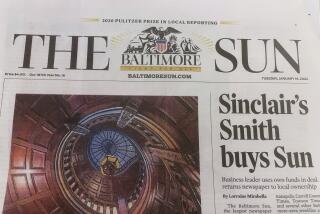Robert Maxwell, 68, Media Giant, Found Dead in Sea : Publishing: Briton vanished from his yacht. His debt-laden empire includes the N.Y. Daily News.
WASHINGTON — Robert Maxwell, the Czechoslovak war orphan who became a billionaire British gentleman and grandiose global media baron, was found dead Tuesday in waters off Spain’s Canary Islands, where he had been vacationing on his yacht.
Authorities said Maxwell, 68, who earlier this year had bought the New York Daily News, vanished overnight from the 180-foot Lady Ghislaine. His unclothed body was found several hours later.
His mysterious death came as Maxwell was embroiled in yet another international controversy, something common in a life that had the improbable, extravagant and sometimes mysterious character of British fiction.
Maxwell had just been accused in a new book by reporter Seymour Hersh of having close ties to the Israeli secret service. He also had been forced, under a staggering debt load, to sell off some of the most precious parts of his global media empire.
His death prompted immediate concerns in British financial circles about the future of his debt-laden empire and in New York about the future of the Daily News, still one of the nation’s largest metropolitan papers.
Among Maxwell’s assets, which he personally ruled with a dictatorial and mercurial passion, were the Macmillan publishing house in New York; Britain’s No. 2 paper the Daily Mirror; the Daily Record; the European, and British Printing & Communications Corp., Britain’s largest printing company.
British Prime Minister John Major called Maxwell, who was born Jan Ludvik Hoch to Jewish peasants in Czechoslovakia, “a great character who will be missed.”
“He was larger than life . . . the Citizen Kane of his time,” said British Conservative Party lawmaker Anthony Beaumont-Dark, referring to Orson Welles’ classic movie about a publishing baron--presumably William Randolph Hearst. “If you wrote a film about his life it would be rejected as unrealistic.”
A labor union leader once said Maxwell “could charm the birds out of the trees. And then shoot them.”
“Maxwell was a passionate friend of Israel, and we are sorry about this heavy tragedy,” Israeli Prime Minister Yitzhak Shamir said. “God bless his memory.”
Maxwell was a man who loved the limelight. He traveled with a personal photographer, and for his birthday each year his French-born wife of 45 years gave him a bound volume of the newspaper clippings that mentioned him.
His body was found 20 miles northwest of Grand Canary Island after an extensive air-and-sea search, according to officials at the rescue center in Madrid. The body was taken by helicopter to the Gando air base on Grand Canary, where it was identified by Maxwell’s wife, Elizabeth, and their son, Phillip. An autopsy is planned for today, and the cause of death is officially still unknown.
The last details of his life are sketchy. He was last seen alive on the deck of the his yacht at 4:45 a.m., Daily News spokesman John Campi said. At 11 a.m., a business call arrived from New York, and the crew discovered Maxwell was not aboard. Campi said Capt. Gus Rankin then radioed a distress call. The body was found several hours later.
The Financial Times quoted Robert Pirie, president of Rothschild Inc. and Maxwell’s principal investment banker, as saying, “Bob used to go swimming all the time without telling anybody.
“He would just go down the ramp and take a swim, and it used to scare the hell out of his crew. I think he probably just went for a swim.”
Weather officials said the skies were clear and seas calm at the time of Maxwell’s disappearance.
In London, Charles Wilson, director of Maxwell’s Mirror Group Newspapers, dismissed any suggestion of foul play, saying, “We can only assume that Mr. Maxwell slipped and fell overboard.”
Maxwell had been due to deliver a speech to the annual dinner of the Anglo-Israel Assn. at a London hotel Monday night, but organizers were told about 30 minutes before the event began that he was ill. His son Ian delivered the speech instead.
After Maxwell’s death, the boards of his companies named one of his seven children, Kevin, 32, as acting chairman of Maxwell Communications, which is chiefly involved in publishing and information services, and as publisher of the Daily News, and son, Ian, 35, as acting chairman of the Mirror Group of British newspapers. The sons have long worked in the family business.
The mystery of Maxwell’s death was typical of his life. “His past seems almost too exotic to be true,” journalist Margareta Pagano once wrote in the defunct Sunday Correspondent.
In his telling of his life story, Maxwell said that, after his parents were killed by the Nazis, he “led Czech volunteers” to France. With the fall of Paris, he moved to England, joining the British army and winning the country’s highest military medal. Along the way, he used several noms de guerre --Ivan du Maurier, Leslie Jones and finally Ian Robert Maxwell.
Maxwell built his empire after the war by striking a deal with a German scientific publishing house for exclusive worldwide rights to export its back and current issues. He soon had similar contracts with most of the Eastern Bloc. His kind words through his publishing efforts and public statements toward repressive Communist regimes led to controversy over his politics.
In 1969, Maxwell tried to sell his publishing house, Pergamon Press, to financier Saul P. Steinberg, who eventually sued, charging that Maxwell had inflated the company’s value. The British government agreed, declaring that Maxwell “cannot be relied on to exercise proper stewardship of a publicly quoted company.” The scandal cost Maxwell his company, his Labor Party seat in Parliament and $6.25 million to settle the lawsuit.
But Maxwell bought Pergamon back in 1974 and rebuilt his empire bigger than ever. He bought Britain’s largest printing company, BPCC, in 1981, and the Mirror Group newspapers in 1984, making him one of Britain’s most important publishers.
Throughout, most of Maxwell’s funds were sheltered in a private foundation in the tax haven of Liechtenstein.
And in recent months, the empire seemed threatened by the debt that some British analysts estimated at close to $5 billion.
Maxwell had been selling assets to raise money to meet a $750-million debt payment due in October, 1992.
In March, he sold the jewel of his empire, the publishing house Pergamon Press, to Elsevier NV of the Netherlands. He sold 49% of the Mirror Group of newspapers in a public offering, and earlier this month, he sold the directory business of another publisher, Macmillan Inc., to the British publisher Reed International for $146 million in cash.
The plan was to sell existing assets to pay off the money borrowed to acquire new ones, but the sales have not run as smoothly as anticipated and debts built up. About 71% of Maxwell Communications’ profits are now going as interest payments to the banks. In particular, analysts say, the loss of Pergamon’s cash flow restricted the whole Maxwell empire.
And more sales were expected. Last week, Henry McQuillen, the newly appointed head of Macmillan Publishing, resigned, and Maxwell Communications was reported to be negotiating to sell two of its main businesses. Official Airline Guide was rumored to be going, as was the computer publisher Que--often seen as the jewel in the crown at MCC.
Recently, financial experts in London and New York began to talk about “the Max Factor”--a belief that Maxwell had become a financial liability.
“Some people felt that if he stepped down from various things, it might be useful for parts of the group,” explained Gerald Raingold, a senior executive at Paribas Banque, which had been advising Maxwell on disposing of some assets.
Ultimate ownership of his companies is almost impossible to trace through a complicated structure of charitable and family trusts and holding companies spread from London to Liechtenstein to Gibraltar.
“He is the only person who knows the ins and outs of the business. If anything happened to him, there will have to be some significant rethinking by the banks,” said one analyst when news of his disappearence was announced.
The latest chapter was the controversy involving Hersh’s book “The Samson Option” about Israel’s efforts to acquire nuclear weapons. The book alleges that Maxwell was “known for his closeness to Israel’s top leadership” and that the foreign editor of Maxwell’s Mirror newspaper helped the Israeli secret service find an Israeli nuclear scientist who was hiding out in London. The allegations created a major scandal in Britain, and last week Maxwell sued Hersh for libel. Hersh, who countersued, said in an interview that he had much more on Maxwell that he had learned but not published.
“Anyone who writes about Maxwell anticipates litigation, and it would be absolutely imprudent not to stash a lot more than you wrote,” Hersh said.
Free-lance writer Angella Johnson, in Los Angeles, contributed to this story.
Maxwell’s Empire
Here is a look at major holdings of Robert Maxwell:
MAXWELL COMMUNICATION CORP. PLC Information Services and Electronic Publishing * Maxwell/Macmillan Information Services (Standard Rate & Data Service, National Register Publishing Co., Business Mailers Inc.) * Macmillan Professional & Business Reference * Prentice Hall Information Network * Official Airline Guide (information for travelers) * Maxwell Online Inc. * Nimbus Records (compact discs)
Language Instruction * Berlitz International * International Learning Systems
Publishing * Macmillan Publishing Co. * P.F. Collier (encyclopedias) * Macdonald Group (trade publications) * Macmillan/McGraw Hill School Publishing Co. * Maxwell Consumer Publishing & Communications Ltd. (magazines) * Fixot S.A. (France)
Associated Companies * Donohue Inc. (forest products) * BPCC Ltd. (commercial printing) * Quebecor Printing Inc. (commercial printing)
MIRROR GROUP OF NEWSPAPER PLC * Daily Mirror, London (daily, circulation 3.1 million) * Sunday Mirror, London (Sunday, circulation 2.9 million) * The People, London (weekly tabloid, circulation 2.6 million) * Daily Record, Glasgow, Scotland (daily, circulation 780,935) * Sunday Mail, Glasgow (Sunday, 880,958)
OTHER HOLDINGS * Maxwell Satellite Communications * New York Daily News, circulation 762,000, purchased from Tribune Co. in March. * The European, weekly newspaper circulated in Europe and United States, launched in May, 1990. * The Racing Times, U.S.-based horse racing paper, launched in April. * Owns one-third of Maaric, daily newspaper in Tel Aviv, Israel, circulation 150,000 Source: International Directory of Corporate Affiliations
More to Read
Sign up for Essential California
The most important California stories and recommendations in your inbox every morning.
You may occasionally receive promotional content from the Los Angeles Times.










